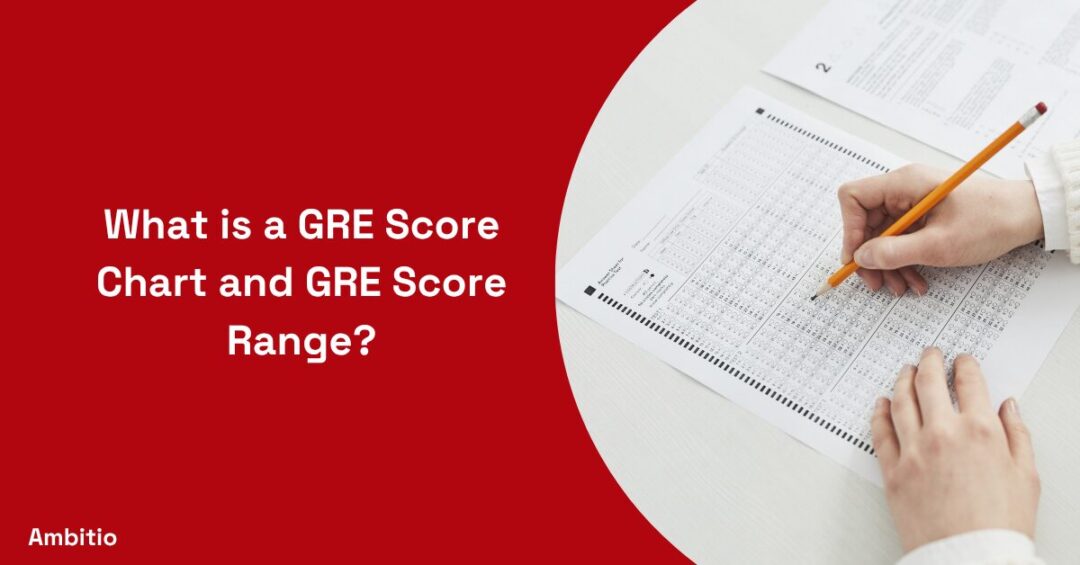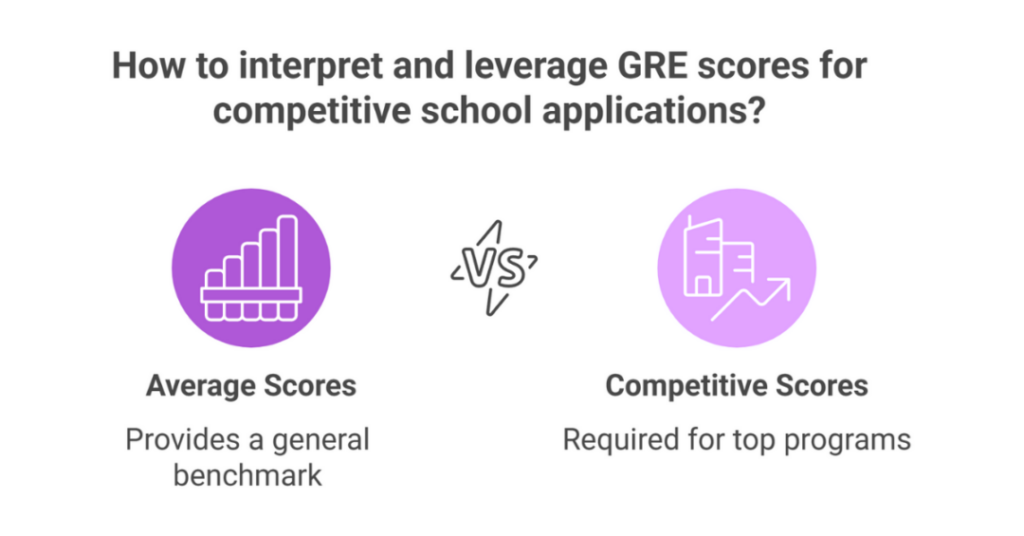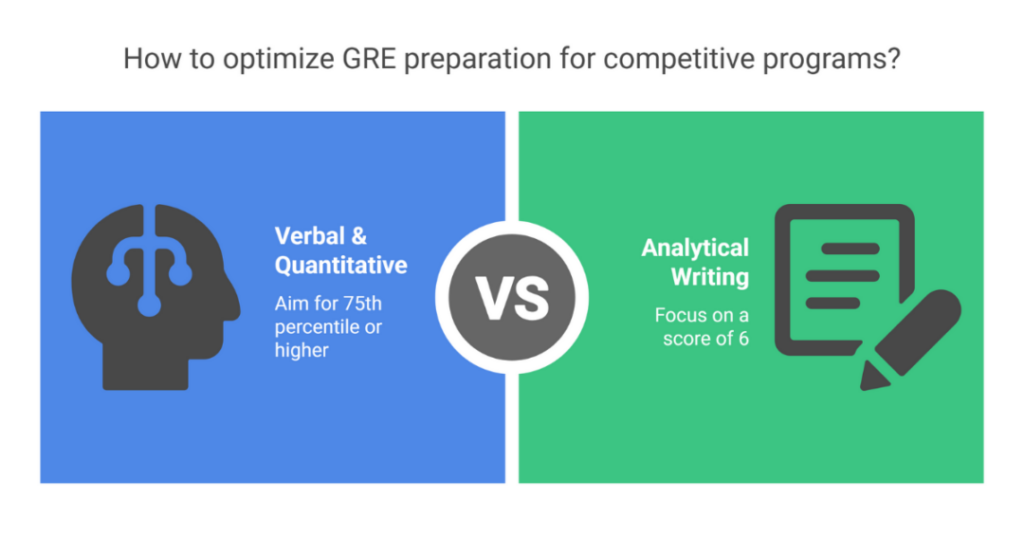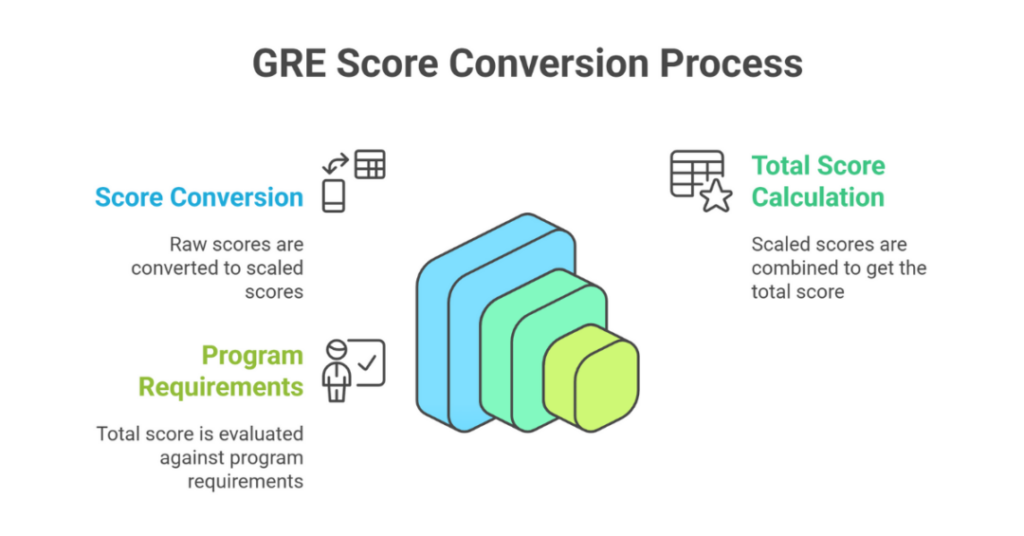2 July 2025
8 minutes read
What is a GRE Score Chart and GRE Score Range?

Key Takeaways
- GRE score chart helps you understand the scoring system for Verbal, Quant, and AWA sections, simplifying your target-setting for top universities.
- GRE score chart provides clear insight into percentile rankings, aiding in evaluating your performance compared to other test takers.
- GRE score chart is essential for aligning your GRE results with admission requirements for your desired graduate programs.
The world average for test-takers of the GRE test is around 300, but most top schools need by far better scores to even be looked at. With so many different expectations, it can be daunting to figure out what a good quantitative and verbal score is, particularly for students targeting competitive institutions.
The greatest challenge is cracking the code in numbers. What exactly do varying GRE general test ranges mean? Does GRE have negative marking? How can you determine whether your score is sufficient?
And most importantly, how can you use your score to make your overall application stand out? By understanding the GRE score report and ranges, you’ll have a better idea of where you’re at and how to proceed smartly with the GRE subject test.
What is the GRE Score Chart Range?
The GRE test score range is between 130 and 170 for each of the Verbal Reasoning and Quantitative Reasoning sections of the GRE exam, giving the total GRE score range between 260 and 340.
Your raw score depends upon the number of correct responses, which is subsequently transformed into a scaled score. The writing score, also referred to as the Analytical Writing score, is distinct, rated on a 0 to 6 scale.

Knowing where you are in this score range assists you in evaluating your performance for every section of the GRE. Right strategies and preparation can help you crack GRE in one month even.
Scoring in the 75th percentile or above places you above the mean GRE score, which is approximately 300. An excellent verbal section and quantitative reasoning score can increase your overall score and percentile ranking.
To achieve this, you will have to concentrate on improving the number of questions that you get right. This enhances your verbal reasoning, quantitative score, as well as your overall score level. Shoot for a 75th percentile or higher to have the greatest chance in competitive programs. Also, make sure to understand whether you can write GRE without a passport.
What is a Good GRE Score Range?
What’s a good GRE score? It can be subjective and depends on your goals. For most GRE test takers, a good score is one that meets their program’s requirements.
GRE scores are calculated by converting raw scores into a scaled score between 130 and 170 for both the Verbal Reasoning section and the Quant section, leading to a maximum score of 340. Many consider a score of 318 good, but this may vary depending on the school.
Your final score is determined by how your raw score is converted and computed into a single score that is reported across sections. With the right preparation, you can crack GRE even in 2 months.
For top programs, you’ll need a higher GRE, GMAT, SAT, IELTS, TOEFL and ACT score. While the average score on the GRE is around 300, aiming for the best GRE scores means targeting a score in the 90th percentile or higher.
Understanding your target score based on GRE score requirements helps you know what you need to achieve. Note that GRE scores are subjective, but to get a score good enough for competitive schools, focusing on both the Verbal Reasoning score and the GRE Quant score is essential.
What is an Average GRE Score?
The average GRE score typically falls around 300, with slight variations depending on the test taker’s strengths in different sections. A single score is reported for each section—Verbal and Quantitative—making it easier for schools to assess your performance.
While the perfect GRE score of 340 is rare, knowing the average gives you a benchmark to gauge where you stand. There are many postgraduate courses without GRE in USA but make sure to choose ones that align with your goals.

But remember, a good GRE score is subjective and depends on the program you’re applying to. The GRE score for the verbal section might weigh more heavily for some schools, while others focus on the quant section. Ultimately, the score you need will be based on the specific requirements of your target programs. Also, have a clear idea of whether GRE is mandatory for MS in USA.
What is the Total GRE Score?
The total GRE score is the combined result of your Verbal Reasoning and Quantitative Reasoning sections. Each section is converted to a scaled score ranging from 130 to 170, resulting in a total GRE score between 260 and 340.
When you took the GRE, your raw scores were converted to this score scale, which universities use to evaluate applicants. Gain a good understanding of the GRE and TOEFL scores for good universities in USA.
The score might seem straightforward, but remember that a good GRE score is subjective and depends on the program you’re aiming for. Some GRE scores for top schools are higher than others, so your target score in GRE prep should align with your specific goals.
Ultimately, it’s about achieving a score good enough to get you into your desired program. Choose the right GRE books to gain a competitive advantage in the exam.
How to do a GRE Score Conversion?
GRE score conversion involves translating your raw scores from the Verbal and Quant sections into a scaled score. For GRE takers, the maximum GRE exam score is 340, with 170 for each section.
Your raw score is computed based on the number of correct answers, and this raw score is then converted using the GRE score scale. Also, keep your GRE appointment number and GRE admit card handy before the exam.
To understand your GRE scores, you need to know that the conversion accounts for variations in test difficulty, ensuring fairness across all GRE takers. Achieving a high GRE score requires aligning your efforts with the specific GRE requirements of your target programs.
The details on GRE scoring give you a clearer picture of how your score is computed and how you can reach your desired results. Keep all of these in mind before submitting your GRE application.
What are GRE Score Percentiles?
GRE score percentiles show how you performed compared to other test takers. Each section—Verbal and Quant—has around 40 questions, and your score is ranked against others who took different GRE versions. For example, if your math score falls in the 80th percentile, you scored higher than 80% of test takers.
Percentiles and GRE scores work together to help schools understand your performance beyond the raw score. Knowing your percentile can give you insight into where you stand and how competitive your scores are for admissions. Have a solid GRE action plan in hand.
How GRE Scores are Calculated?
GRE scores are calculated through a detailed process that ensures fairness across different test versions and accurately reflects your abilities. The GRE test consists of three sections: Verbal Reasoning, Quantitative Reasoning, and Analytical Writing. Let’s break down how each of these is scored.

Verbal and Quantitative Reasoning Scores
Each of these sections has approximately 40 questions, and your raw score is based on the number of correct answers you give. There’s no penalty for incorrect answers, so guessing doesn’t harm your score.
Once your raw score is determined, it is then converted to a scaled score ranging from 130 to 170. This score conversion is crucial because it adjusts for differences in test difficulty, ensuring that your score fairly reflects your ability, regardless of the specific questions you faced. Include all these elements in your GRE 10 day study plan as well.
Analytical Writing Score
For the Analytical Writing section, you’ll write two essays: one on an issue and the other on an argument. Each essay is graded on a scale of 0 to 6 by both a human rater and a computer system. If their ratings are similar, the average becomes your score. If there’s a significant difference, a second human rater steps in, and your score is determined by the average of the two human ratings.
Final GRE Score
The Verbal Reasoning and Quantitative Reasoning sections contribute to your total GRE score, which ranges from 260 to 340. These scores are reported separately alongside your Analytical Writing score, which is on a 0 to 6 scale.
While many schools emphasize the total score or your individual section scores, others might focus more on percentiles, which compare your performance with other test takers.
Expert Tips to Get a Good GRE Score
Getting a good GRE score requires strategy, practice, and a focused approach. Here are some expert tips to help you achieve your target score:
Start with a Solid GRE Prep Plan
Begin by setting a clear study schedule. Determine how much time you need based on your current skill level and the score you aim for. Use reliable resources like GRE prep books, online courses, and practice tests to help you understand the exam format and improve your skills.
Regular practice ensures you’re familiar with the question types, so you’re not caught off guard. Consistency is key to building confidence and reaching your goal.
Focus on Your Weak Areas
Identify your weaker sections early on, whether it’s the Verbal Reasoning, Quantitative Reasoning, or Analytical Writing section. By understanding your weak points, you can tailor your study plan to focus more on them.
Spend extra time practicing those areas to turn them into strengths. Take full-length practice exams to track your progress and adjust your study focus as needed. The goal is to improve overall while closing gaps in specific areas.
Master Time Management
Time management is crucial for the GRE. Each section is timed, so practicing under real-time conditions is essential. Learn to pace yourself so you have enough time to answer all the questions without rushing. Focus on answering easier questions first and come back to more difficult ones if time permits. Efficient time management can significantly boost your performance on test day.
Take Full-Length Practice Tests
Regularly taking full-length practice tests helps you simulate test day conditions. These tests allow you to build stamina and become comfortable with the GRE format. Review your answers after each test to understand your mistakes and learn from them.
These insights can help you adjust your study strategy and refine your approach. Over time, you’ll notice your confidence increasing, leading to a better score.
Stay Calm and Focused on Test Day
The GRE can be stressful, but staying calm is essential to success. Anxiety can affect your performance, so practice relaxation techniques like deep breathing or visualization.
Make sure you get plenty of rest the night before the exam and eat a healthy meal. Arrive early at the testing center to avoid last-minute stress. A clear, calm mind will help you perform at your best when it counts.
Conclusion
Understanding GRE scores, from how they are calculated to what constitutes a good score, is essential for effective preparation.
Whether you’re aiming for a competitive program or simply want to meet specific GRE requirements, knowing the score ranges, percentiles, and key strategies will help you achieve your goals. By focusing on a solid study plan, improving weaknesses, and staying calm on test day, you can confidently work towards a strong GRE score that opens doors to your future academic pursuits.
Score Higher on the GRE: Ambitio’s Bootcamp is Your Secret Weapon! Gain insider knowledge and strategies from GRE experts, turning your prep into a strategic advantage on test day.
FAQs
What is a GRE score chart?
A GRE score chart is a standardized table that shows scaled scores and their percentile rankings. A GRE score chart helps you evaluate how competitive your scores are.
How do I use a GRE score chart to interpret my results?
You can use a GRE score chart to compare your raw scores with percentiles. A GRE score chart also helps determine if your scores meet university cutoffs.
Where can I find an official GRE score chart?
You can access the official GRE score chart on ETS’s website. The GRE score chart there is updated periodically to reflect recent testing trends.
Does the GRE score chart change every year?
While the scoring scale remains fixed, the GRE score chart may adjust percentile rankings yearly. The GRE score chart adapts based on test-taker performance trends.
What does the GRE score chart show for Quant and Verbal sections?
The GRE score chart displays scaled scores (130–170) for both sections. The GRE score chart also maps these to percentiles for a better performance overview.
How accurate is a GRE score chart in predicting admissions chances?
A GRE score chart offers a reliable benchmark but not a guarantee. However, a GRE score chart does help assess if you meet average admitted scores.
Can I use a GRE score chart to plan my prep strategy?
Yes, a GRE score chart helps identify target scores for top programs. A GRE score chart also guides your prep focus based on percentile cutoffs.

You can study at top universities worldwide!
Get expert tips and tricks to get into top universities with a free expert session.
Book Your Free 30-Minute Session Now! Book a call now




























